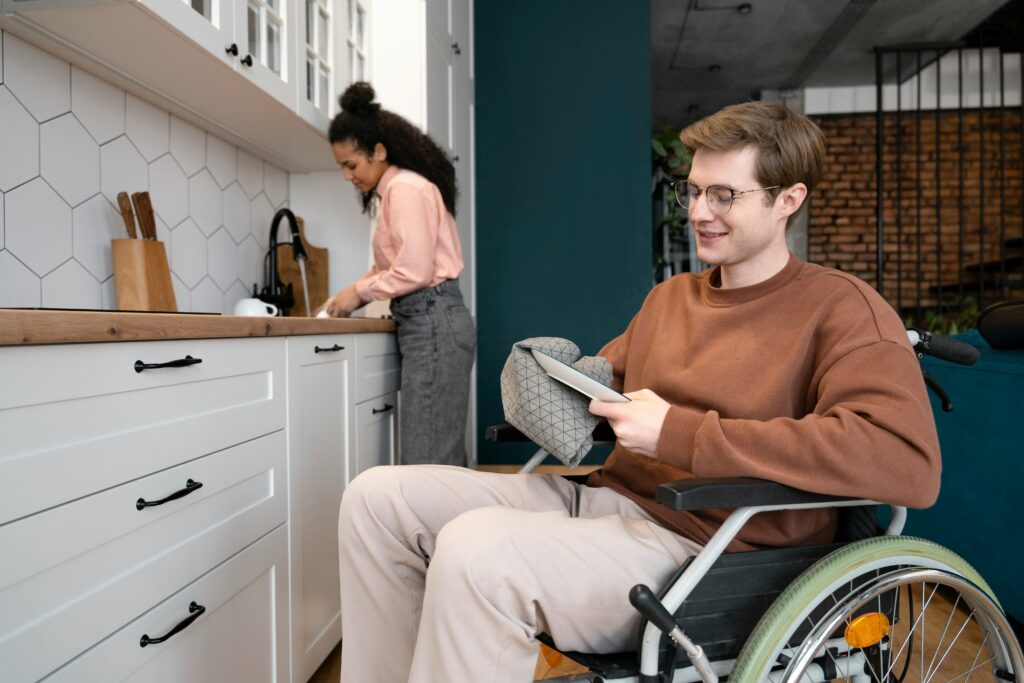Let’s face it – life is busy.
Between work, family, social obligations, and everything else we juggle on a daily basis, some of the most basic tasks like making a meal or tidying up, can feel like the monster of chores. And for people with disabilities, these once-simple tasks can become mountains too steep to climb. That’s where OT steps in like a superhero, offering a helping hand in meal preparation and housekeeping skills.
Remember the Last Time You Made Your Own Meal?
Close your eyes and think back. I’m sure it wasn’t that long ago when you proudly whipped up a meal that tasted just right (and yes, maybe it was a little burnt, but we all know that crispy edges have character). Whether you spent hours crafting a gourmet dinner or simply threw together a quick sandwich, there’s a special kind of satisfaction in preparing your own food. That feeling of accomplishment when you sit down to enjoy the fruits of your labor? Priceless.
But as our lives get busier, sometimes the joy of cooking is overshadowed by the thought of all the time and energy it takes. Let’s be honest—making dinner can sometimes feel like an Olympic sport, especially after a long day. You start to ask yourself: Why is everything so complicated? Does anyone really layer their lasagna? And how does someone manage to spill sauce everywhere in the kitchen?
Now, imagine you’re someone with a disability which makes these tasks even more challenging. Suddenly, these everyday chores can become not just overwhelming, but downright impossible. And that’s where OT swoops in to save the day.

The Superpowers of OT
OT isn’t just about giving you tips on how to use a spoon correctly (though that’s a pretty valuable skill in itself). When it comes to meal prep and housekeeping, OT’s true superpower is helping identify barriers that make these tasks harder for you to manage. It’s not just about fixing the task but finding solutions that work for you.
How Does OT Tackle Meal Prep?
When you work with an OT, one of the first things they’ll do is assess your unique needs and abilities. They’ll ask questions like, “What part of cooking do you find most challenging?” or “Which tasks take the most energy?” By identifying these barriers, OT can recommend practical changes that make a huge difference in your daily life.
For example, do you have trouble reaching the top shelf of your kitchen cabinets? OT might suggest using a step stool with sturdy handles to improve your balance or relocate items you use often to easy to reach areas. Struggling with chopping vegetables because your grip isn’t what it used to be? OT might recommend special adaptive tools, like knives with ergonomically designed handles that make slicing through those carrots a breeze. Or maybe you’re exhausted just from standing at the stove, OT can suggest a rolling cart or a perching stool that allows you to sit while still being productive in the kitchen.
Sometimes, it’s not about adding tools, though. It’s about breaking down the task into manageable steps. OT will help you organise meal prep into bite-sized portions (pun intended), and maybe even give you the confidence to try cooking something new. Remember: Rome wasn’t built in a day, and your gourmet dinner doesn’t need to be either. Start with something simple, and work your way up. Maybe a sandwich today, a hearty soup tomorrow!
Housekeeping—Not Just for Marie Kondo
And what about housekeeping? Well, as you may have guessed, OT’s help extends beyond just the kitchen. Between vacuuming, dusting, organising, and all the stuff we collect (how many coffee mugs does one person need?), it’s easy to get overwhelmed.
OT can help simplify these tasks by breaking them down into smaller, manageable chunks. Maybe you start with a simple “one room at a time” approach, or you could use color-coded cleaning supplies to stay organised. If you’re having trouble bending to dust off low surfaces, OT might suggest tools like extendable dusters or even help you adjust your home layout to minimise unnecessary movements.
Building Confidence One Step at a Time

At the end of the day, OT isn’t just about giving you strategies and tools, it’s also about boosting your confidence. Sometimes, the hardest part of meal prep and housekeeping is simply believing that you can do it. Maybe you’ve been avoiding cooking because of a past mishap (burning the toast, anyone?), or you’ve been relying on takeout because it feels easier. OT is there to build your confidence and remind you that these tasks are within reach and you can totally rock them, one step at a time.
Conclusion: A Little Help Goes a Long Way
So, the next time you’re standing in front of your kitchen, wondering if you should just grab the phone and dial your local Dominos, remember this: OT can help make meal prep and housekeeping easier, more manageable, and (dare we say) fun again. Whether it’s a few clever adaptations, breaking down tasks, or just helping you find your groove in the kitchen, OT is there to help you reclaim those everyday activities that bring so much joy and satisfaction.
And hey, even if the meal ends up looking like a Instagram fail, at least you know you tried and that’s a win in itself.
Who’s ready for that sandwich?
Leave a Reply